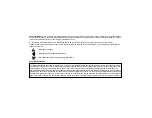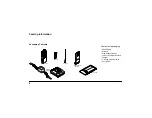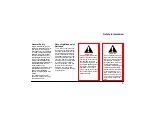
3
General Safety
In the United States, the Fed-
eral Communications Commis-
sion (FCC), with its action in
General Docket 79-144, March
13, 1985, has adopted a safety
standard for the human expo-
sure to radio frequency (RF)
electromagnetic energy emit-
ted by FCC-regulated equip-
ment. Proper operation of this
radio will result in user exposure
substantially below the FCC
recommended limits.
Outside the United States, simi-
lar standards may exist. Con-
tact your local standards
agency for more detailed infor-
mation.
The following are general
safety precautions for using a
conventional radio:
Recycling/Disposal of
Batteries
The U.S. Environmental Pro-
tection Agency (EPA) classi-
fies used nickel-cadmium (Ni-
Cd) batteries as hazardous
waste, unless certain exemp-
tions apply. At the end of your
battery’s useful life, it can be
recycled. However, recycling
facilities may not be available
in all areas. Under various
state or local laws, such bat-
teries must be recycled or
disposed of properly, and
cannot be dumped in landfills
or incinerators.
Safety Information
WARNING:
Operating the radio with a
headset or other accesso-
ries at high volume levels
can damage ears and
result in hearing loss. Hear-
ing experts advise against
continuous high volume
operation. If you experi-
ence a ringing in your ears,
reduce the volume level or
discontinue use.
!
WARNING:
Do not operate this equip-
ment near electrical blast-
ing caps or in an explosive
atmosphere. Under cer-
tain conditions, radios can
interfere with blasting
operations. Observe signs
cautioning against radio
transmission in the vicinity
of construction work. If
radio transmission is pro-
hibited, you must turn off
your radio and not transmit
until you are clear of the
area.
!







